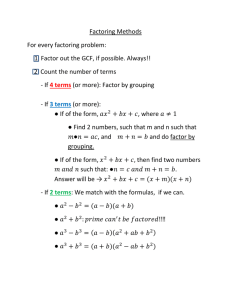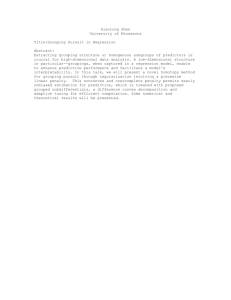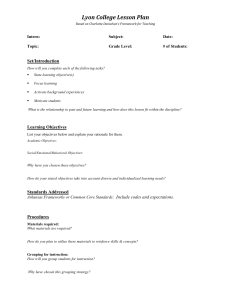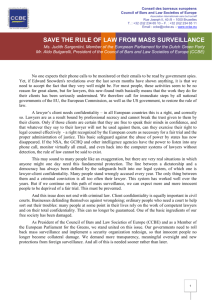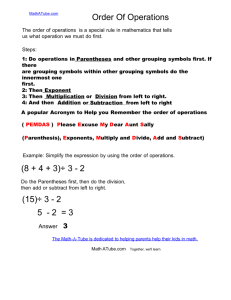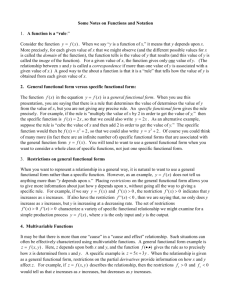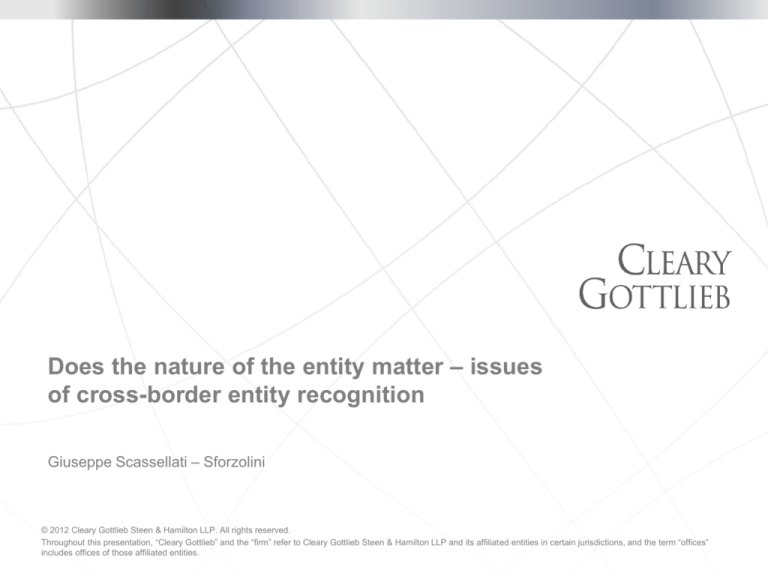
Does the nature of the entity matter – issues
of cross-border entity recognition
Giuseppe Scassellati – Sforzolini
© 2012 Cleary Gottlieb Steen & Hamilton LLP. All rights reserved.
Throughout this presentation, “Cleary Gottlieb” and the “firm” refer to Cleary Gottlieb Steen & Hamilton LLP and its affiliated entities in certain jurisdictions, and the term “offices”
includes offices of those affiliated entities.
EU Single Market - Liberal Regime ... for Individual Lawyers
EU approach is NOT harmonization of regulation, which remains at national level.
Circulation is free in principle, giving credit to home country regulation.
Restrictions admissible only if in the general interest and proportional. So, the
nature of the entity matters and so does effectiveness of regulation applicable to it.
EU single market for legal services: has achieved full freedom to practice for
individual lawyers (both cross-border and by physical establishment)
• Directive 77/249 implements freedom to provide cross-border services right in
Article 56 TFEU, as interpreted by the ECJ case law
• Directive 98/5 implements freedom of establishment right in Artice 49 TFEU
– Individuals who are citizens of an EU member state and hold a professional
qualification in an EU member state may establish in any other member state
to practice host country law under their home country title. Only requirement
is registration with host country bar.
– After 3 years of regular and effective practice in the host country the migrant
lawyer may also obtain the host country professional title (waive-in)
2
EU Single Market – Limited Rules for Law Firms
TFEU Treaty freedoms apply also to partnerships and corporate entities. However,
EU implementing rules are limited as regards law firms and largely defer to host
country rules
Law Firms (so-called joint practice): Article 11 Directive 98/5 focuses less on law
firms, than on the right of migrant lawyers (under certain conditions having regard
to host country law) to (1) establish a branch of their home country law firm and
(2) access a form of joint practice existing in the host country
• (1) One or more lawyers who belong to the same grouping in their home Member
State and who practise under their home-country professional title in a host Member
State may pursue their professional activities in a branch or agency of their grouping in
the host Member State. However, where the fundamental rules governing that
grouping in the home Member State are incompatible with the fundamental rules … in
the host Member State, the latter rules shall prevail insofar as compliance therewith is
justified by the public interest in protecting clients and third parties.
However, in light of the EU case law (e.g., Centros) restrictions based on legal
structures are less likely to withstand scrutiny
3
EU Directive 98/5 Permits Membership Based Restrictions
Article 11(5) condones, on its face without limitations, restrictions on firms
including non-lawyers
• (5) … a host Member State, insofar as it prohibits lawyers practising under its own
relevant professional title from practising the profession of lawyer within a grouping in
which some persons are not members of the profession, may refuse to allow a lawyer
registered under his home-country professional title to practice in its territory in his
capacity as a member of his grouping. The grouping is deemed to include persons who
are not members of the profession if
- the capital of the grouping is held entirely or partly, or
- the name under which it practises is used, or
- the decision-making power in that grouping is exercised, de facto or de jure,
by persons who do not have the status of lawyer within the meaning of Article 1(2).
Where the fundamental rules governing a grouping of lawyers in the home Member
State are incompatible with the rules in force in the host Member State or with the
provisions of the first subparagraph, the host Member State may oppose the opening
of a branch or agency within its territory without the restrictions laid down in point (1).
EU Commission is conducting a review of the Directive. Comments are said to
focus mainly on Article 11
4
Developments in Other EU Jurisdictions
The CCBE in response to an LSB consultation stated that a large majority o
member States are expected to apply Article 11(5) to ABSs (with outside capital)
•
http://www.ccbe.eu/fileadmin/user_upload/NTCdocument/EN_CCBE_response_to_1_1253701378.pdf
French bar openly opposes ABS and recently stated that ABS do not enjoy the
fundamental freedoms
• AFFIRME que les Alternative Business Structures ne peuvent pas être
considérées comme des cabinets d’avocats, notamment dans le cas où la
majorité du capital est détenue par des non avocats, et, par conséquent, ne
peuvent pas bénéficier des libertés d’établissement et de circulation pour
s’inscrire à l’un des barreaux du pays d’accueil.
http://cnb.avocat.fr/Les-Alternatives-Business-Structures-ABS-mettent-en-danger-les-principes-essentiels-de-laprofession-d-avocat-et-les_a1290.html
German bar (BRAK) opined to the Joint Committee on the Legal Services Bill that
“German Rechtsanwälte as well as solicitors and barristers established in
Germany would infringe German professional rules if they became a member of
such type of an ABS”. (See also ABA’s 2012 reaffirmation of prohibition of sharing
fees with non lawyers)
Italy has introduced ABS (with outside capital but voting rights limited to less than
one-third) over the fierce opposition of the local bar.
5
EU Court has Blessed Certain Membership Based Restrictions
According to EU case law, non-discriminatory restrictions to the fundamental
freedoms, are subject to a proportionality test
• “restrictions …. may be justified by overriding reasons relating to the general
interest, provided that the restrictions are appropriate for securing attainment of
the objective pursued and do not go beyond what is necessary for attaining that
objective”
However, EU Court of Justice Wouters Judgment (2002) upheld ban on MDPS
between lawyers and auditors (not accountants)
• Dutch bar regulations “designed to ensure the proper practice of the profession
…” identify ”the essential rules adopted for that purpose …” as “the duty to act
for clients in complete independence and in their sole interest, the duty … to
avoid all risk of conflict of interest and the duty to observe strict professional
secrecy.” Court concludes that the ban is “… necessary in order to ensure the
proper practice of the legal profession, as it is organised in the Member State”
ABS with outside capital may be harder still to defend, other than by application of
proportionality test, based on rigorous entity level regulation and enforcement
Potentially helpful line of case law (e.g., Webb) looking at the extent to which home
country regulation already protects the general interest at issue
Or possibly building general interest and proportionality into Article 11(5)
6
NEW YORK
WASHINGTON
PARIS
BRUSSELS
LONDON
MOSCOW
FRANKFURT
COLOGNE
ROME
MILAN
HONG KONG
BEIJING
BUENOS AIRES
SÃO PAULO
ABU DHABI
www.clearygottlieb.com
www.clearygottlieb.com

